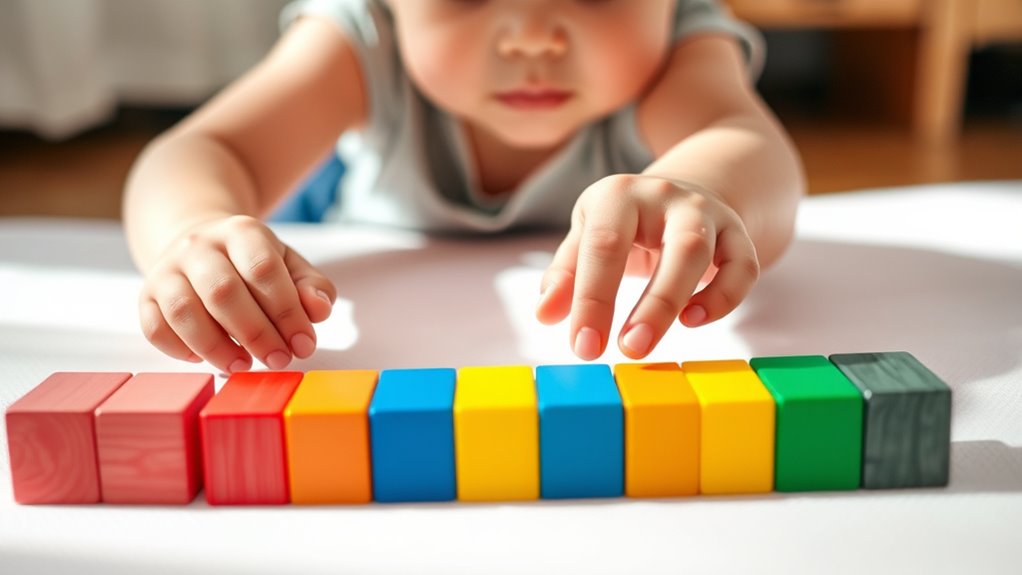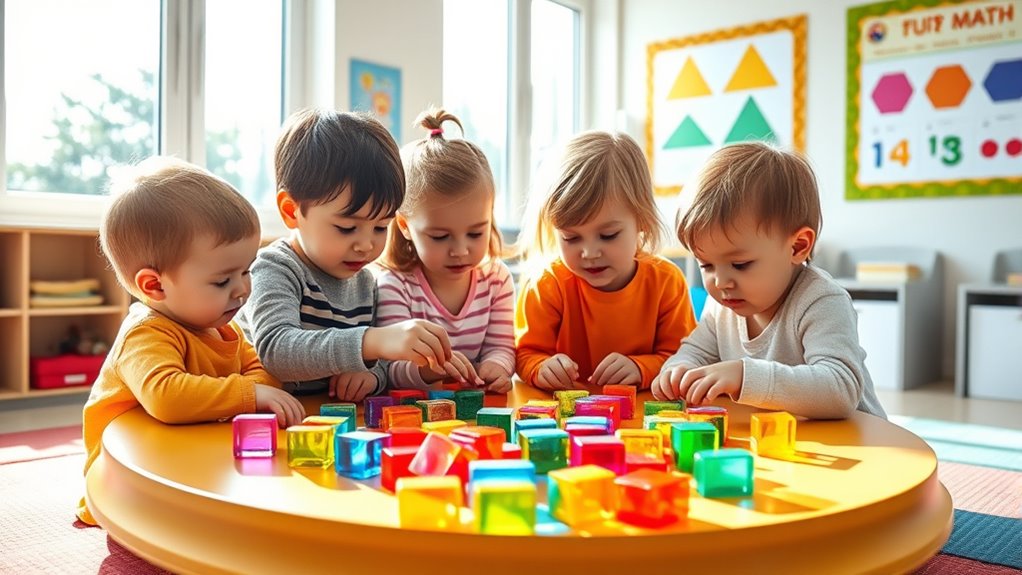At ages 3 to 4, your child starts recognizing numbers, counting objects, and noticing patterns like stripes or rhythms. They begin understanding that numbers represent amounts and can predict what comes next in simple sequences. Engaging in everyday activities, like counting steps or matching shapes, builds these foundational skills in a fun way. Keep exploring these opportunities, and you’ll help your child develop a strong math base that supports future learning.
Key Takeaways
- Children begin recognizing numerals and understanding their connection to quantities around ages 3-4.
- They develop pattern awareness by noticing sequences in their environment, such as colors and rhythms.
- Counting objects in daily activities like play or routines helps strengthen early math skills.
- Engaging children with simple sorting and matching activities fosters recognition of shapes and patterns.
- Early exposure to numbers and patterns builds confidence and lays the foundation for more advanced math learning.

Have you ever wondered when children start to grasp basic math concepts? It’s fascinating to watch as they begin to make sense of the world through numbers. Typically, this understanding starts emerging around age two or three, when children begin to develop essential skills like number recognition and pattern awareness. These early milestones lay the groundwork for more complex mathematical thinking later on. As a caregiver or educator, your role in nurturing these skills is indispensable, and it often begins with simple, everyday activities.
Number recognition is a fundamental step in early math development. At first, children learn to identify numerals, understanding that each symbol corresponds to a specific quantity. For example, they might recognize the number ‘1’ as representing a single object or ‘2’ as two objects. This skill isn’t just about memorizing symbols; it’s about associating numbers with real-world quantities, which helps them understand the concept of quantity itself. You can support this by pointing out numbers in books, on signs, or during daily routines like counting snacks or toys. Repetition and consistency help children associate the numeral with its value, making it easier for them to recall and recognize numbers over time.
Alongside number recognition, pattern awareness plays a fundamental role in early math skills. Children begin to notice patterns in their environment—like stripes on a zebra, the sequence of colors in a rainbow, or the rhythmic beat of a song. Recognizing patterns helps children predict what comes next, which is a foundational math skill. For instance, if they see a pattern of red, blue, red, blue, they start understanding the idea of sequence and repetition. You can foster pattern awareness by engaging children in activities like sorting objects by color, shape, or size, and creating simple patterns with blocks or beads. Asking questions like “What comes next?” encourages them to observe and anticipate, reinforcing their understanding of sequences and order.
Developing these skills doesn’t require formal lessons. Instead, everyday moments—like counting steps on a walk, recognizing numbers on a clock, or matching shapes—offer valuable opportunities. As children practice number recognition and pattern awareness, they build confidence and a deeper understanding of how numbers work in their environment. This early exposure not only makes learning math enjoyable but also sets a strong foundation for future learning. When you actively engage children with these simple, fun activities, you’re helping them develop critical skills that will serve as the building blocks for more advanced math concepts down the line.
Frequently Asked Questions
When Should Children Typically Start Counting?
You should start working on counting when your child begins to recognize numbers and show interest in patterns and sorting. Usually, children around age 2 to 3 can start understanding simple counting concepts. Encourage them to count objects, recognize number shapes, and sort items by size or color. Active engagement with counting, number recognition, and pattern sorting helps build their early math skills and confidence.
How Can Parents Encourage Early Math Skills?
Ever wonder how you can boost your child’s early math skills? You can make learning fun by playing number games and encouraging shape recognition. Ask questions like, “Can you find the circle?” or “How many blocks are here?” These activities help your child develop essential skills naturally. Remember, engaging consistently and praising their efforts builds confidence and enthusiasm for math from the start.
What Are Common Developmental Milestones in Early Math?
You’ll notice your child reaching milestones like recognizing numbers and identifying patterns. They may start counting objects, understanding simple addition or subtraction, and sorting items by shape or color. Celebrate these achievements, as they indicate growing mathematical understanding. Encourage activities that involve counting, matching, and pattern recognition, and stay patient—these milestones build a strong foundation for future math skills. Your support helps them develop confidence and a love for learning.
Are There Recommended Educational Toys for Counting?
You should choose educational toys like number puzzles and math games to help your child develop counting skills. Number puzzles encourage them to recognize numerals and associate them with quantities, while math games make learning fun and interactive. These toys promote hands-on learning, improve problem-solving skills, and build a strong math foundation early on. Incorporate them into playtime to support your child’s growing understanding of numbers and counting.
How Does Early Math Impact Later Academic Success?
Imagine opening a door to a world where numbers dance and math confidence grows with each step. Early math skills like number recognition build a strong foundation, boosting your child’s confidence to tackle more complex problems later. This solid start helps them excel in academics, making future learning smoother and more enjoyable. By nurturing these skills early, you set your child on a path to academic success and lifelong love of learning.
Conclusion
As you watch your child explore numbers and shapes, a world of possibilities unfolds before you. Each new skill they grasp brings a spark of confidence, yet the journey has just begun. Imagine the moments when they’ll count independently, recognize patterns, and solve puzzles. With each step, you’re shaping their future—what amazing discoveries await just around the corner? Stay curious, because the adventure of early math skills is only getting more exciting.









